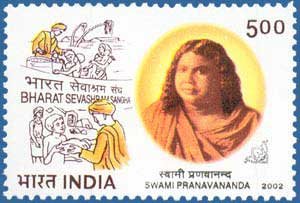Swami Pranavananda (1896-1941)

Technical Data
| Date of Issue | November 3, 2002 |
|---|---|
| Denomination | Rs. 5 |
| Quantity | 500,000 |
| Perforation | comb 13 |
| Printer | Security Printing Press, Nashik |
| Watermark | No Watermark |
| Colors | Multicolor |
| Catalog Codes |
Michel IN 1928 Stamp Number IN 1980 Yvert et Tellier IN 1693 Stanley Gibbons IN 2095 WADP Numbering System - WNS IN039.02 |
| Themes | Famous people | Men | Reformers |
Table of Contents
Swami Pranavananda (1896-1941)
Overview
Swami Pranavananda was a prominent spiritual leader and social reformer of modern India. He is revered for his teachings on universal love, nationalism, and social service, and played a significant role in the spiritual and social awakening of India during the early 20th century.
Early Life and Spiritual Awakening
- Birth: Born in the Faridpur district of East Bengal (now in Bangladesh).
- Childhood: Exhibited philosophical inclinations and a deep sense of contemplation from a young age. Known for his helpful nature and popularity among local children.
- Spiritual Initiation: In 1913, he met Yogiraj Baba Gambhir Nathji Maharaj in Gorakhpur, which profoundly influenced his spiritual journey. He was formally initiated into spirituality and began his journey towards becoming a spiritual leader.
Establishment of Bharat Sevashram Sangha
- Formation: In 1923, Swami Pranavananda established the Bharat Sevashram Sangha, a mission dedicated to social service and the spread of his spiritual teachings.
- Philosophy: Emphasized the need for national unity and self-reliance. Believed that India’s lack of unity was the reason for its vulnerability to foreign rule. Advocated for a cohesive and strong India through spiritual awakening and social reform.
- Activities: The Sangha initiated various social services including:
- Cottage Industries: Promoted local industries and economic self-sufficiency.
- Educational Institutions: Established a Brahmachari school, primary schools, and free dispensaries.
- Humanitarian Work: Conducted relief work during floods and other disasters.
- Publications: Launched a magazine called Pranav to disseminate his teachings and message.
Impact and Legacy
- Nationalism: His teachings had a strong nationalist foundation, inspiring many freedom fighters and contributing to India’s struggle for independence.
- Social Reforms: Worked to unite people across religious and social divides, promoting ideals of sacrifice, self-discipline, truth, and continence.
- Spiritual Guidance: Advocated practical spirituality and self-realization. His teachings were compiled in the Sangha-Geeta, which provides guidance to his followers.
Final Years
- Continued Efforts: Swami Pranavananda remained dedicated to his mission until his death in 1941, tirelessly working to awaken and strengthen the Indian populace.
Commemorative Stamp
The Department of Posts has issued a commemorative postage stamp in honor of Swami Pranavananda, recognizing his contributions to spirituality, nationalism, and social reform. The stamp highlights his role in the Bharat Sevashram Sangha and his impact on India’s social and spiritual landscape.
